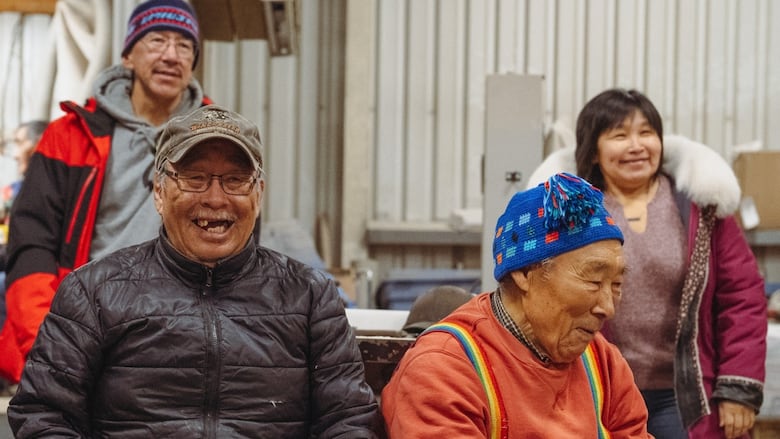Safe spaces across Inuit Nunangat a must in suicide prevention, advocates say
Suicide rates in the region estimated to be 5 to 25 times higher than rest of Canada

WARNING: This story discusses suicide.
In 1998, Igloolik, Nunavut, was rocked by the deaths of two teenagers by suicide.
Guillaume Ittukssarjuat Saladin remembers being deeply shaken, along with many others in the community.
From that tragedy, he started looking for ways to help young people express themselves through creativity. He saw adults in the community working on films for Isuma Productions — but there was nothing similar for youth in Igloolik.
With help from others in the community, Saladin then started Artcirq, the now-renowned film and performing arts collective.
"All those artistic disciplines, when you master them, you can really express yourself and inspire people — and everybody on the planet is going to understand," he said.
"We're not a factory of acrobats and clowns. We're not trying to make everybody fit in a mould. We're just a space where we can dream together and take care of each other."

Inuit Tapiriit Kanatami estimates suicide rates across Inuit Nunangat to be five to 25 times higher than the rest of Canada. In June, the Nunavut government again declared suicide a crisis in the territory, a decade after making a similar declaration.
Saladin said having community spaces for people to do art or sports is a crucial component of suicide prevention.
That's why the loss earlier this year of a significant cultural space in Igloolik – which contained Artcirq's performing arts space – to a fire was so devastating to the community.
Saladin said he's grateful the local school is sharing its gymnasium space for Artcirq to do some rehearsals, as the organization works to rebuild. But he believes the incident speaks volumes to the need for more spaces.
"If there is a community hall with great workers that can make sure that those spaces are open, are safe for young people to go there, feel good and develop themselves – that's the key," he said.
Saladin is quick to say he's not a psychologist or a therapist, but a circus performer who has experienced the power that the arts can have in helping somebody through a tough time.
"Sometimes you'll feel lost. Talk to a friend. Learn how to express your feelings, and if you can't with words then find other ways. Run, jump, dance, play music," he said.
For Willia Ningeok in Nunavik, effective intervention can also mean helping young people connect with their traditional culture.
As a teenager, Ningeok had to grapple with the loss of his older brother to suicide. Over the years, he's personally known up to 10 people who've died by suicide, but he said he stopped keeping track.
Now, he's helping steer others away from that as the president of Unaaq Men's Association in Inukjuak, Que. The group organizes activities like traditional tool-making and outings on the land.
"Owning a dog team is lots of work. It keeps you busy, [and is] very good for the mind and body. So I try to do that and bring them out to the land as many times as possible," he said.

Ningeok said there aren't many places to talk or participate in activities across Nunavik. And even when people do speak up about their struggles, he said they're often judged. To change that attitude, he believes it requires early intervention.
"If we can get them early on, before they're teenagers … grab them before they get mental issues. Keep them busy," he said.
Listening without judgment
Every night, volunteers are busy responding to calls at the Kamatsiaqtut Nunavut Helpline.
Sheila Levy worked in Pangnirtung, Nunavut, in the 1970s and '80s, and personally saw several of her students die by suicide. Years later, she helped launch the helpline.
At the time, she didn't really see services available in the North for people to talk about what's on their mind. She said with Kamatsiaqtut, people can talk about anything, whether it be advice on how to make gravy for the Christmas turkey, or addictions issues.
However, she acknowledges they're mostly hearing from the people who choose to come forward for help. Levy said the helpline does outreach work, like having volunteers speak to patients at the Qikiqtani General Hospital, to create awareness about their services.
She also believes it's important to remember that many people could be at risk without showing obvious signs. That means there needs to be a safe environment for people to talk without judgment.
"It's so important to allow somebody like a survivor or somebody at risk … to be able to talk about any emotions, even though it might be something that might sound disrespectful, but it isn't," she said.
"You can be angry at somebody for dying, but at the same time feel very sad. You can be feeling guilty, you can be feeling shame."
If you or someone you know is struggling, here's where to get help:
-
In Nunavut, reach the Kamatsiaqtut Help Line 24/7 at 1-800-265-3333 or 867-979-3333.
-
Suicide Crisis Helpline 24/7 by phone or text 24/7, toll free by dialing or texting 9-8-8.
-
Hope For Wellness Helpline: 1-855-242-3310 (phone, available in Inuktitut, Cree and Ojibway upon request).
-
Kids Help Phone: 1-800-668-6868 (phone), live chat counselling on the website.
-
Canadian Association for Suicide Prevention: Find a 24-hour crisis centre.
This guide from the Centre for Addiction and Mental Health outlines how to talk about suicide with someone you're worried about.

